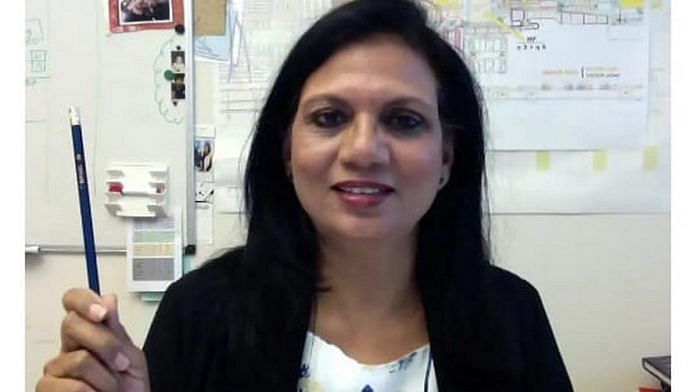New Delhi: India needs more female role models to encourage girls to pursue careers in science, technology, engineering and mathematics (STEM), feels CERN scientist Archana Sharma, who was part of the team that discovered elementary particle Higgs Boson in 2012.
Sharma has been working at the European Organization for Nuclear Research, known as CERN, for over 30 years now, and is globally recognised for her work on gaseous detectors for research in High Energy Physics, which explores what the world is made of.
“Just imagine, once people in India got to know of Kalpana Chawla, girls started opting for those disciplines. Parents are also slowly changing mindsets, as I see. This can be amplified by making role models more visible,” she tells ThePrint in an exclusive interview.
Sharma was an important part of the team involved in the discovery of the Higgs Boson. Her expertise lies primarily in building gaseous detectors for particles and radiation. She has authored and co-authored over 800 research publications.
Since India became a member state of the CERN in 2017, Sharma has been coordinating collaborations, and even guiding Indian interns at CERN. “India is involved with the CERN in different ways. It is part of the accelerator projects, numerous experiments, and computing projects.”
She adds, “India has to have a diverse portfolio, we can’t just be participating in just one aspect. Because if that one experiment fails, it is a big risk. So we are playing small roles in a multiple project.”
Sharma also runs an NGO, Life Lab Education and Research Foundation, which works to create partnerships with educational institutions for the benefit of the underprivileged.
“Every six weeks I come to India, giving my time to schools and institutes to give talks and interact with students, teaching them whatever little I can about particle physics,” she says.
‘Women scientists have to perform twice as well’
Sharma says her parents never treated her any different from her brother, but things were different at work.
She says she was initially not taken seriously by her male colleagues despite her qualifications.
“This ‘initially’ is a very long period because you have to establish yourself. Your work has to be noticed, only then your peers validate you as an equal colleague. Only then they start taking you seriously,” Sharma says.
She says women scientists have to perform twice as well to get the same level of acknowledgment and acceptance an average male scientist gets.
“A man can continue to be an average scientist and he will still be taken seriously. But for a woman to survive in a man’s field, she has to perform twice as well to get the same level of acknowledgement and acceptance as an average male scientist in the community,” she says.
Also read: Team led by Indian-origin scientist finds way to better predict disease risk from DNA codes
‘I used to feel under confident among men’
Due to India’s increased involvement with CERN, Sharma makes frequent visits to India, and this has given her the opportunity to interact extensively with school and university students.
During her interaction about her work and the field of particle physics, she tries to encourage girls to participate and speak up more.
“As a woman working in a European setting, I had to start thinking differently because I realised that when I was sitting among a group of men I was slouching and under confident,” she recalls.
“It was only very recently, possibly two years ago, that I realised this. I asked myself why am I always containing myself?” Sharma says.
The scientist believes women need to be taught from a very young age to consider themselves equal to everyone. While there are already a lot of initiatives taken by the Indian government for girls, there still lies a massive challenge because of our culture and traditions, she says.
“Women are often hesitant and unsure about contradicting what the boss has said. These kind of things are inherent and it takes time to come out of that.”
Even now, Sharma says, when she tells people she works in Geneva, they assume she is either a translator or a UN representative, pointing to the deep-rooted gender bias that exists in how one describes leadership positions.
“You have to change the concepts of man power to ‘person power’ or chairman to chairperson,” Sharma asserts. “We have to go exponential and accelerate the pace at which people change their mindsets in rural India.”
‘India’s huge population not an impediment’
Among her many engagements, Sharma is part of the Indian government’s CodeIndia initiative that aims to bring computer programming into the school curriculum.
According to Sharma, while the vast and diverse population of the country makes it difficult to make educational labs and scientific resources available to all children, there is always a solution to every problem.
“I don’t see the huge population as an impediment, it just means that there is always work to do or things to do. When I am in India, I do not have a single moment free,” she says.
Also read: Antibiotic in human skin can beat superbugs. Now scientists have a way to put it to use




Dear Mohana – please note that finding the Higgs Boson was a huge collaborative team effort which included many Indian Institutions. Thank you.
Mohana – Thank you for introducing Dr Archana Sharma to us. And if I am responding to real Dr Archana Sharma, I truly hope that your future work helps mankind reach closer to ‘reality’. Best wishes.